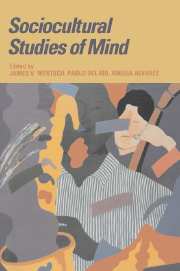Book contents
- Frontmatter
- Contents
- Series Foreword
- List of contributors
- Sociocultural studies: history, action, and mediation
- Part I Human action: historical and theoretical foundations
- 1 Cultural–historical psychology and the psychological theory of activity: retrospect and prospect
- 2 The need for action in sociocultural research
- 3 Theories of action, speech, natural language, and discourse
- Part II Mediation in action
- Part III Sociocultural setting, intersubjectivity, and the formation of the individual
- Part IV Sociocultural settings: design and intervention
- Index
3 - Theories of action, speech, natural language, and discourse
Published online by Cambridge University Press: 05 June 2012
- Frontmatter
- Contents
- Series Foreword
- List of contributors
- Sociocultural studies: history, action, and mediation
- Part I Human action: historical and theoretical foundations
- 1 Cultural–historical psychology and the psychological theory of activity: retrospect and prospect
- 2 The need for action in sociocultural research
- 3 Theories of action, speech, natural language, and discourse
- Part II Mediation in action
- Part III Sociocultural setting, intersubjectivity, and the formation of the individual
- Part IV Sociocultural settings: design and intervention
- Index
Summary
Human action as the main concern of psychology
Reflections on the status of psychology are normally summed up in several commonplace propositions as follows. First, the subject matter of the discipline is behavior, or rather observable behavior and the mental phenomena associated with it; radical behaviorism confines itself solely to behavior, and within the framework of this perspective we do not discuss directly the status of animal behavior. Second, behavior is dynamic; the human organism behaves (conducts itself), or in other words it interacts actively in its setting or beyond it in the world. Thus, behavior is still activity, in the first and general sense of the term, Leont'ev's Tatigkeit. Third, active behavior involves a simultaneous transformation of the world and of the organism itself; one form of the organism's transformation is the growth in understanding. Hence, the commonplace yet conclusive formula: Understanding is derived from activity. And fourth, the task of psychology is to interpret forms of active behavior. It is first of all to explain (or understand) the structure of these forms of behavior, how they function, and how they are constructed. The follow-up task is to explain (or understand) the structure, functioning, and ways in which this understanding produced by the behavior is elaborated.
The quasi-ecumenical nature of these propositions is obviously just a facade; some fundamental differences exist with regard to the actual status of behavior, the foundations of activity, the role of understanding, and, as a result, the actual type of interpretive process to be applied to these objects.
- Type
- Chapter
- Information
- Sociocultural Studies of Mind , pp. 75 - 92Publisher: Cambridge University PressPrint publication year: 1995
- 17
- Cited by

